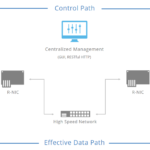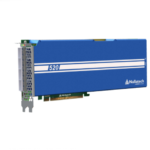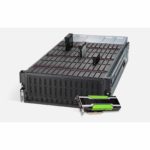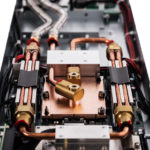At SC17 in Denver, Cavium showcased a wide variety of ThunderX2 Arm-based server platforms for high performance computing. “ThunderX2 server SoC integrates fully out-of-order, high-performance custom cores supporting single and dual-socket configurations. It is optimized to drive high computational performance delivering outstanding memory bandwidth and memory capacity. The new line of ThunderX2 processors includes multiple SKUs for both scale up and scale out applications and is fully compliant with Armv8-A architecture specifications as well as the Arm Server Base System Architecture and Arm Server Base Boot Requirements standards.”
Intel Xeon Scalable Processors come to Penguin on Demand HPC Cloud
Penguin Computing has announced plans to deploy more than 11,500 cores of the latest Intel Xeon Scalable processor in their Penguin Computing On-Demand HPC cloud. “The latest Intel Xeon Scalable processor expansion will provide an ideal compute environment for MPI workloads that can leverage thousands of cores for computation. We have significant customer demand for POD HPC cloud in applicable areas like high-resolution weather forecasting and computational fluid dynamics, including solutions from software partners like ANSYS, Flow Science and CD-adapco.”
Excelero NVMesh powers Canada’s new SciNet Petascale Storage Facility
Today Excelero announced that SciNet, Canada’s largest supercomputer center, has deployed Excelero’s NVMesh server SAN for the highly efficient, cost-effective storage behind a new supercomputer at the University of Toronto. “For SciNet, NVMesh is an extremely cost-effective method of achieving unheard-of burst buffer bandwidth,” said Dr. Daniel Gruner, chief technical officer, SciNet High Performance Computing Consortium. “By adding commodity flash drives and NVMesh software to compute nodes, and to a low-latency network fabric that was already provided for the supercomputer itself, NVMesh provides redundancy without impacting target CPUs. This enables standard servers to go beyond their usual role in acting as block targets – the servers now can also act as file servers.”
Univa Grid Engine Powers University of Oxford Human Genetics Centre
Last week at SC17, Univa announced its Univa Grid Engine distributed resource management system is powering the Wellcome Centre for Human Genetics’ (WHG) high performance computing environment. WHG is a research institute within the Nuffield Department of Medicine at the University of Oxford. The Centre is an international leader in genetics, genomics, statistics and structural biology with more than 400 researchers and 70 administrative and support personnel. WHG’s mission is to advance the understanding of genetically-related conditions through a broad range of multi-disciplinary research.
GRC Builds GPU-Based Immersion Cluster for TACC
Green Revolution Cooling has announced plans to deliver a custom GPU-based cluster to the Texas Advanced Computing Center (TACC). Our goal is to make HPC more affordable. Offering lower cost, energy dense servers that take full advantage of our highly efficient CarnotJet cooling system is a huge benefit to our customers,” said Larry Stone, VP of Engineering at GRC “we are seeing a growing number of people opt for servers designed for immersion, over traditional big brand OEM hardware.”
New BeeGFS 7.0 Delivers All-Flash Performance at Spinning Disk Price
Last week at SC17, ThinkParQ announced immediate availability of the BeeGFS version 7.0 release candidate. While previous versions of BeeGFS are already running on systems of all kinds and sizes around the globe (including burst buffers, hyper-converged setups and of course dedicated high-performance enterprise storage), this new major release introduces several features that were desired by the BeeGFS community.
Nallatech Showcases Next Generation FPGA Accelerators at SC17
Last week at SC17, Nallatech showcased their FPGA solutions for high-performance computing, low latency network acceleration, and data analytics. “FPGAs are being deployed in volume across a range of on-premise platforms and cloud infrastructure to achieve a step-change in application performance and energy-efficiency above and beyond what can be achieved using conventional processor technologies” said Craig Petrie, VP Business Development of FPGA Solutions at Nallatech. “We’re excited to be showcasing our new OpenCL-programmable ‘520’ product range featuring Intel Stratix-10 FPGAs. These server-qualified accelerator products have been engineered to cost-effectively solve demanding co-processing and real-time data ingest and enrichment applications.”
SkyScale HPC Cloud steps up with Volta GPUs
Last week at SC17, SkyScale announced its partnership with Rescale, the foremost cloud simulation and HPC solution provider, and availability of NVIDIA Tesla V100 GPU accelerators on its GPU as a Service cloud platform. Enhancing SkyScale’s dedicated, cloud-based ultra-fast multi-GPU platforms for deep learning and HPC applications, the Tesla V100 offers the performance of 100 CPUs in a single GPU—enabling data scientists, researchers, and engineers to tackle the most difficult deep learning and HPC challenges.
Video: Nyriad Unveils GPU-accelerated Storage Device for the Square Kilometer Array
At SC17 last week, Nyriad Limited demonstrated their company’s first commercial product, Nsulate, a GPU-accelerated storage solution that enables increased storage resilience while reducing the storage power requirements by over 50 percent. “Using a GPU as a storage controller inserts an enormous amount of general purpose processing power directly into the storage pipeline, enabling modern HPC storage appliances to deliver unprecedented speed, scale, security, storage efficiency and intelligence in real-time.”
Energy-efficient CoolMUC-3 Cluster comes to LRZ in Germany
An new energy-efficient supercomputer called CoolMUC-3 has been deployed at LRZ in Germany. Developed by MEGWARE, the HPC cluster features Intel’s many-core architecture and warm-water cooled Omni-Path switches. “In the long run, we want to get rid of inefficient air-cooling completely.”












